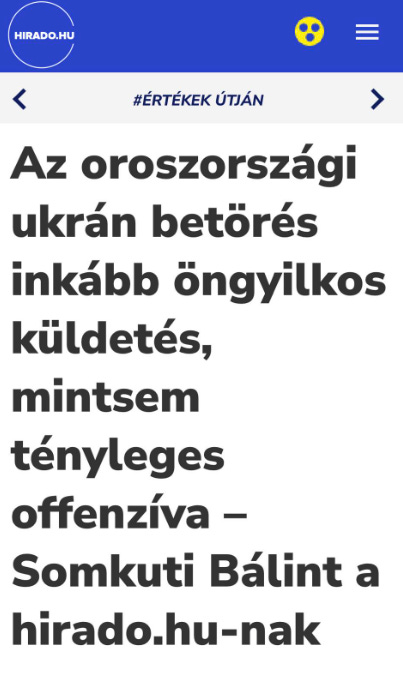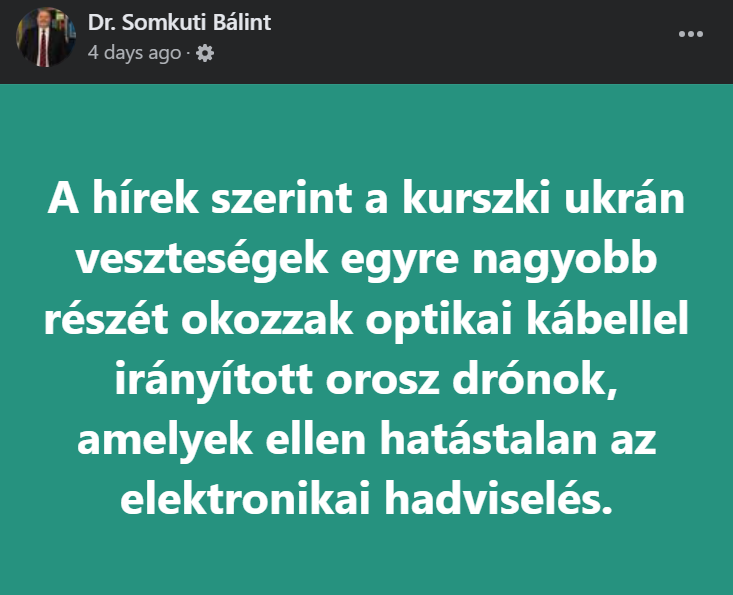For some time, I've been contemplating a fresh perspective on the impact of Russian propaganda. The existing English articles on this subject often fall into two categories: they either focus on the involvement of local politicians or parties, framing the issue within a Western context, or they delve into excessive detail, akin to reading J.R.R. Tolkien's Silmarillion.
This morning, I stumbled upon some links and Facebook posts in a group where we share open-source intelligence (OSINT) data about the war and information about Hungarian "experts" who seem to be promoting Russian propaganda. This could provide a glimpse under the hood.
It's important to note that the influence of Russian propaganda is not limited to Hungary. The Russians use similar methods across Central and Eastern Europe, most notably in Slovakia and the former East Germany, shaping public opinion on the war in Ukraine. There are subtle differences, as Russians are good at localizing their propaganda. In-depth knowledge of local culture and careful mapping of the effects help them.
The end product is terrifying. We are talking about countries that suffered from Russian (Soviet) occupation and the horrors of Stalinism. They (we) should hate the Russians or at least be very, very cautious about them like our Polish friends do.
However, a significant number of people in these countries are successfully brainwashed by Russian propaganda. They believe Russia did not initiate the conflict, attributing it to the influence of the American fracking lobby or big agricultural companies.
More than a substack post needs to go into detail, but the posts I stumbled upon will give some insight. Let’s go hunting Russian propaganda.
Meet Dr. Bálint Somkuti.
Dr. Somkuti, a geopolitics and security expert at the Mathias Corvinus Collegium (MCC), a think tank and school that prepares the new generations for Orbán’s party, is a key figure in promoting Russian propaganda. It’s important to note: I am not saying, not even implying, that he is a Russian agent. He is a typical vector of Russian propaganda. If I wanted to be rude, I’d call him a useful idiot.
His predictions, such as the one for August 14th, have often been ridiculed. His influence is significant. He is among the 6-8 experts regularly featured in government media.
Here, Dr. Somkuti described the Ukrainian offensive near Kursk as a "suicidal intrusion rather than a genuine offensive." The offensive was a major embarrassment for the Russians but not Dr. Somkuti.
Here, we see an important element of Russian propaganda in action: building a parallel reality.
The Russian forces had to evacuate civilians and their military, retreating over 50 kilometers as they struggled (and still struggle) to establish a stable frontline. The Ukrainian artillery and air force inflicted severe damage, catching Moscow off guard. In response, new leaders have been appointed to regain political control. While the Russians have not been defeated or collapsed, the Ukrainian forces have dealt them a major blow, severely threatening their entire operation in East Ukraine.
Meanwhile, in the Hungarian media, Dr. Somkuti and some other experts still portray the situation as a minor operation where the Russians will ultimately achieve victory.
Getting through the membrane
Perhaps the most important (and overlooked) detail about Russian propaganda is how it attaches itself to and finds a way into public consciousness.
Thanks to medical advancements, we now have a perfect analogy for how propaganda seeps in, analogous to how viruses enter human cells. Scientists have discovered how specific proteins on the virus lock onto other proteins on the cell's outer membrane.
Propaganda is like a virus that seeks out similar entry points. These entry points can be universal or unique to a particular national culture. What is our entry point here?
We are in Eastern Europe, and the best way to understand Eastern European cultural phenomena is to know jokes about them.
Our joke is about American space scientists who brag about a pen they developed for millions of dollars. This pen can write in zero gravity, not leaking a single ink drop. The ink is also highly advanced; it dries without contaminating the spacecraft’s carefully maintained air supply. The Yankees are outright smug about this pen and ask the Soviet colleague at a conference: “So Igor, do you guys have a writing tool that works in zero gravity and overcomes the problems of conventional ink?” Igor looks surprised but answers: of course, we have worked that out earlier. So, what do you guys use? Igor: a pencil.
The moral of the story is that Russians are known for their simple, down-to-earth approach to technical problems. While their solutions may sometimes be rudimentary and primitive, there are cases when they work better than sophisticated Western technology. Similar legends circulate about the rugged T-34 tanks, which required little maintenance and worked when the complicated German Tigers broke down in the harsh Russian winter.
Let’s have a look at a post from Dr. Somkuti.
Dr. Somkuti writes: “According to the news (whose news???) Ukrainian losses in Kursk are increasingly (by how much, on what base???) caused by wire-guided Russian drones, resistant to electronic warfare.”
Note: this is not just false information; it’s much more than that.
It is false in the first place: the Russians have been using these drones for months, the Ukrainians copied the idea, and now a German company builds them for the Ukrainians.
However, we also see a meme virus entering public discourse. It aligns with existing beliefs and subconscious perceptions about Russia. The jamming-resistant drone is a simple and ingenious solution to an otherwise almost unsolvable problem, much like the pencil in the joke.
An average person watching and reading this would think: this is so much like Russians; this is likely genuine information. This gives credibility to the person spreading this propaganda. Dr. Somkuti did not make up this information. He saw and translated it. Now, it is present in Hungarian discourse about the war. Next time I have a beer with my friend who follows the news about the war, he will tell me this story like insider info deeply rooted in his excellent understanding of how Russians balance the Western technology transfer to Ukraine with creativity.
The Russian government has spent many years mapping out and creating new entry points daily. This has become their most effective weapon, even more potent than their nuclear arsenal. In Hungary, about 80% of news and opinions about Ukraine come from sources influenced by or under the control of Russian propaganda. With the media so filled with Russian propaganda, it doesn't matter whether the source spreading it is directly controlled by Russia or not. They all serve as channels for a dangerous and highly contagious influence.









While I understand the desire for self-deprecation, I thought the joke was pretty funny, actually. Maybe it's just because I'd never heard it before.
I'm not sure how you went about editing, but as a native English teacher I feel the need to tell you that one sentence contains a mistake:
"They (we) should hate the Russians or at least be very, very cautious about them like our Polish friends do."
Should be:
"They (we) should hate the Russians or at least be very, very cautious about them like our Polish friends are."
The reasons are complicated and I'm not sure you want to hear them, so I'll just leave this here. Sorry -- I just can't resist as a self-professed grammar nazi.
Please post on Subtack in English more often, your Hungarian perspective on these matters is valuable.
Mióta az első hónapokban Kaiser Ferenc felmosta vele a padlót, azóta kerülöm. Most viszont megnézve az FB oldalát, rosszabb mint gondoltam. Pedig maradhatott volna egy saját szakterületére koncentráló ( nem túl kiváló - felületes odt vizsgálat) NKE-s oktató.